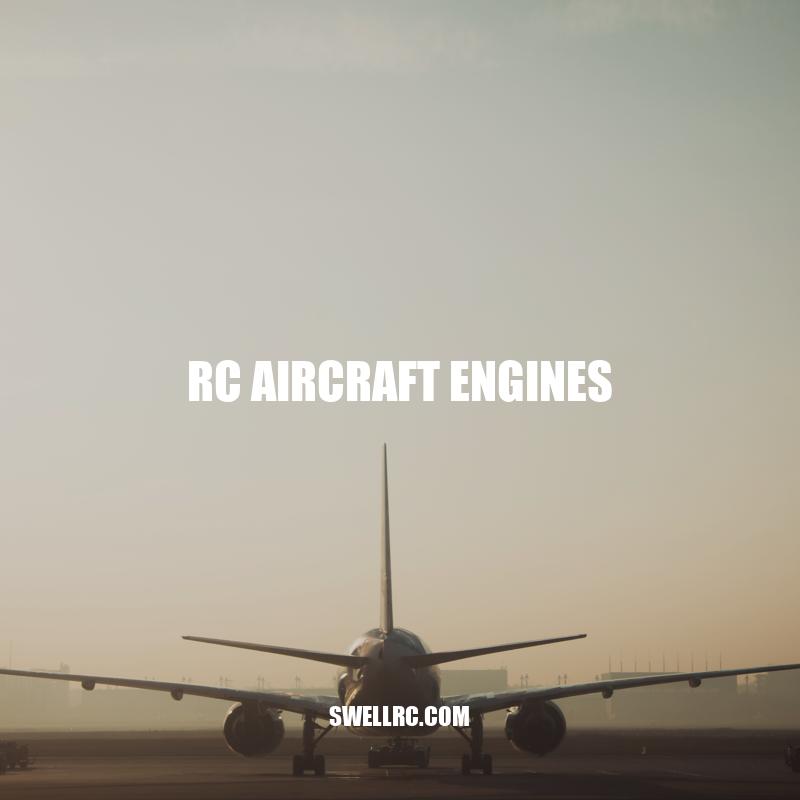RC Aircraft Engines: Types and Features.
Remote control (RC) aircraft are excellent models that are used for a variety of purposes. From hobbyists and enthusiasts to professionals, RC planes and drones have become increasingly popular over the years. However, the performance, speed, and maneuverability of these planes heavily depend on the engine type and quality. The RC aircraft engines are the driving force behind these planes, and understanding their workings is crucial for a successful flight. There are different types of RC aircraft engines, each with its set of advantages and disadvantages. Therefore, selecting the right engine for your aircraft can be challenging. In this article, we’ll discuss the different types of RC aircraft engines and everything you need to know about them. By the end of this article, you’ll have gained insights into the RC aircraft engine world and learned how to choose the right engine for your RC airplane or drone.
Two-stroke engines
Two-stroke engines are the most popular type of engine used in RC airplanes. They use a mixture of fuel and oil to ignite a controlled explosion that generates power. Here are some key features of two-stroke engines:
- Lightweight and portable: Two-stroke engines are compact, making them ideal for smaller RC planes and drones
- Powerful: They are highly efficient at converting energy and generate excellent speed and thrust
- Easy to maintain: Two-stroke engines have simple designs with fewer parts, making it easy to maintain and fix
- Affordable: They are budget-friendly compared to other kinds of RC aircraft engines
Two-stroke engines are the ideal choice for beginners, as they are simple, easy to use, and require no additional equipment. You can find two-stroke engines at various online stores like Horizon Hobby or Tower Hobbies, where you can choose an appropriate engine for your RC aircraft.
What is the two-stroke engine?
A two-stroke engine is a type of internal combustion engine that completes a power cycle with two strokes of the piston, compared to a four-stroke engine’s four strokes. Two-stroke engines are commonly used in small power tools, motorcycles, and boats due to their simplicity and lightweight design. Some disadvantages of two-stroke engines include higher levels of emissions and lower fuel efficiency compared to four-stroke engines.
If you want to learn more about two-stroke engines, you can check out websites of popular manufacturers such as Yamaha, Honda, or Kawasaki. These websites provide technical specifications, performance data, and features of their two-stroke engines. Additionally, you can browse online marketplaces such as Amazon or eBay to find and purchase two-stroke engines for your power equipment or motorcycle.
RC aircraft engines come in different types, but the two most common are two-stroke and four-stroke engines. Two-stroke engines are generally more popular because they are cheaper and easier to maintain. They also have a simpler design and produce high power-to-weight ratios. However, they are known to consume more fuel and have a shorter engine life compared to four-stroke engines.
If you are looking for a two-stroke engine for your RC aircraft, there are several brands you can choose from. One of the popular brands is OS Engines. They produce reliable and powerful engines that are suitable for different types of RC aircraft. Another brand is Evolution Engines which are known for their efficiency and ease of use.
Four-stroke engines are less common in RC aircraft, but they have gained popularity over recent years. These engines have a more complex design and utilize a fuel injection system. Here are some key features of four-stroke engines:
- Quieter: Four-stroke engines run quietly compared to two-stroke engines
- More fuel-efficient: They consume less fuel than two-stroke engines because they have a separate oil system that lubricates the engine rather than mixing with fuel.
- Realistic engine sound: Four-stroke engines produce a more realistic sound and are often seen in scale model aircraft and warbirds
- Durable and long-lasting: They have fewer moving parts and run at a lower RPM, resulting in longer engine life
While four-stroke engines are more expensive, they are worth the investment for experienced pilots looking to upgrade the performance of their RC aircraft. You can purchase four-stroke engines at online stores like RC Superstore or Motion RC.
| Features | Two-stroke engines | Four-stroke engines |
|---|---|---|
| No of Strokes | Two | Four |
| Sound | Produces a high-pitched and loud sound | Produces a realistic engine sound |
| Efficiency | Less fuel-efficient than four-stroke engines | More fuel-efficient |
| Durability | Less durable than four-stroke engines | Durable and long-lasting |
What is the difference between a 2-stroke and 4-stroke RC plane engine?
2-stroke and 4-stroke RC plane engines differ in their combustion cycles. In a 2-stroke engine, there is one firing per revolution, while in a 4-stroke engine, there is one firing per two revolutions. This leads to differences in power output, fuel consumption, and overall performance.
Advantages of a 2-Stroke Engine:
- Higher power output
- Lightweight and compact
- Simpler design and maintenance
Advantages of a 4-Stroke Engine:
- Lower fuel consumption
- Better fuel efficiency
- Quieter operation
Both types of engines have their own advantages and disadvantages, and the choice between the two ultimately comes down to personal preference and specific needs.
To learn more about RC planes and engines, you can visit websites such as Horizon Hobby or Tower Hobbies that offer a variety of models and accessories.
RC aircraft engines come in different types, each with its own strengths and weaknesses. One of the most popular types is the gasoline engine. Gasoline engines are typically larger and more powerful than other types of RC engines. They are popular for larger airplanes and drones. Here are some key features of gasoline engines:
- Powerful: Gas engines produce more power than glow engines and electric engines, making them suitable for large-scale models.
- Fuel-efficient: They are more fuel-efficient than glow engines, providing longer flight times.
- Low pollution: Gasoline engines produce less pollution than glow fuel engines
- Smokeless: Unlike glow fuel engines, gas engines do not produce smoke while running.
- Require maintenance: Gasoline engines require regular maintenance to ensure proper performance. The fuel pump, lines, and carburetor must be cleaned after each use to avoid engine blockage.
Gasoline engines are an excellent choice for RC pilots who want maximum performance from their planes. You can purchase gasoline engines from online stores like Tower Hobbies or Horizon Hobby.
| Features | Glow engines | Gasoline engines | Electric engines |
|---|---|---|---|
| Power | Less powerful than gas engines | More powerful than glow and electric engines | Less powerful than gas engines |
| Noise | Produces more noise than electric or gas engines | Produces more noise than electric engines and less noise than glow engines | Produces less noise than gas and glow engines |
| Emissions | Produces more pollution | Produces less pollution than glow engines | Environmentally friendly |
| Maintenance | Requires moderate maintenance | Requires regular maintenance | Requires minimal maintenance |
What is the difference between glow engine and gas engine?
Glow engines and gas engines are two types of internal combustion engines used in model airplanes, boats, and cars. The main difference between the two is the type of fuel they use.
Glow engines, also known as nitro engines, use a blend of methanol, nitromethane, and oil for fuel. They work by igniting a glow plug using a battery-powered starter which then ignites the fuel in the cylinder. Glow engines have a unique sound and require regular maintenance.
Gas engines, also known as gasoline engines or petrol engines, use gasoline as fuel. They work by compressing air and gasoline in a cylinder, igniting the fuel with a spark, and creating combustion. Gas engines are generally more fuel-efficient and produce less exhaust emissions compared to glow engines.
Overall, the choice between a glow engine and a gas engine depends on the user’s specific needs and preferences.
For more information on model engines, check out hobby shop websites such as Horizon Hobby or Tower Hobbies, which offer a variety of engines for different applications.
RC aircraft engines are an essential part of any remote control aircraft. When choosing an engine, there are several important factors to consider, such as power, efficiency, and noise level.
One popular type of engine used in RC aircraft is the glow engine. These engines use a mixture of nitromethane, methanol, and oil to power the aircraft. Glow engines are known for their power and performance, but they require regular maintenance to keep them running smoothly. Popular brands of glow engines include OS Engines and Saito Engines.
Another type of engine used in RC aircraft is the gasoline engine. Gas engines are known for their power and efficiency, making them a popular choice for larger scale models. They are also known for their long-lasting performance and low fuel cost. Gasoline engines are manufactured by popular brands such as DLE Engines and Zenoah.
For smaller, indoor aircraft, electric engines are a popular choice. These engines use rechargeable batteries to power the aircraft and are known for their low noise levels, consistent power delivery, and ease of use. You can purchase electric engines from online stores like HobbyKing or Amazon. They are also an eco-friendly option since they do not produce exhaust emissions.
In conclusion, when selecting an RC aircraft engine, it is important to consider power, efficiency, noise level, and the size of your aircraft. Whether you choose a glow engine, gas engine, or electric engine, there are numerous options available from top manufacturers in the industry.
Do electric engines make noise?
Answer:
Electric engines are generally quieter compared to conventional gasoline engines. However, they are not completely silent and still produce some noise. The amount of noise produced depends on factors such as the type of electric motor used, the design of the vehicle, and the speed at which it is driven.
Some types of electric motors, such as brushless DC motors, are quieter than others. Additionally, the design of the vehicle can also affect the amount of noise produced. Many electric vehicles are designed with noise-reducing features such as insulation materials, acoustic laminated windows, and sound-deadening materials.
Overall, while electric engines are generally quieter than gasoline engines, they do still produce some noise. However, this noise can be minimized through various design and technical measures.
Website(s) or product(s):
– Tesla Model S: This electric car is well-known for its quiet and smooth ride. It features a brushless AC motor and various noise-reducing design features.
– Nissan Leaf: Another popular electric car, the Nissan Leaf has been designed with noise reduction in mind. It features an electric motor that produces minimal noise and additional sound-proofing materials.
| Electric Engine Type | Noise Level |
|---|---|
| Brushless DC Motor | Low |
| AC Induction Motor | Medium |
| Permanent Magnet Synchronous Motor | High |
- Electric engines are generally quieter than conventional gasoline engines.
- The amount of noise produced depends on factors such as the type of electric motor used and the design of the vehicle.
- Some types of electric motors, such as brushless DC motors, are quieter than others.
- Many electric vehicles are designed with noise-reducing features such as insulation materials and acoustic laminated windows.
Choosing the right engine
Selecting the right engine for your RC aircraft can be a daunting task, and an incorrect choice can lead to reduced performance or flight time for your model. Here are some factors to consider while selecting an RC engine:
- Size and weight of the aircraft: Choose an engine that is suitable for the weight and size of your aircraft. A larger plane will require a bigger and more powerful engine.
- Type of flight: Engines with high power output are suitable for speed and aerobatics, while engines with low power output work well for casual flying.
- Personal preference: Your personal preference is also a deciding factor. Some pilots prefer a particular type of engine, while others prefer a different engine.
- Budget: RC aircraft engines come in various prices, and it’s important to consider your budget while making a purchase.
It’s important to note that beginners are advised to start with two-stroke engines as these are the most simple and reliable option available. As you gain experience with your RC aircraft, you can explore other engine types such as four-stroke engines, gasoline engines, or electric engines.
In addition to considering the factors above, it’s important to purchase your engines from reputable stores. Retailers such as Horizon Hobby, Tower Hobbies, and RC Planet are reliable websites that provide high-quality engines and accessories at reasonable prices.
| Engine Type | Recommended Aircraft | Pros | Cons |
|---|---|---|---|
| Two-Stroke Engines | Small and medium-sized RC aircraft | Lightweight, powerful, and easy to maintain | Require glow fuel that is more expensive and polluting |
| Four-Stroke Engines | Large and heavy RC aircraft | More fuel-efficient and quieter | Heavier and more complex than two-stroke engines |
| Gasoline Engines | Large-scale RC aircraft and drones | Powerful, long-lasting, and fuel-efficient | Louder than electric and glow engines and require more maintenance than electric engines |
| Electric Engines | Small and indoor RC aircraft | Environmentally friendly, low noise, and low maintenance | Less powerful than gasoline engines |
How do I choose a motor for my RC plane?
When choosing a motor for your RC plane, there are a few important factors to consider. Here are some key points to help you make an informed decision:
- Weight of the plane: Determine the weight of your plane and choose a motor that can handle the weight. A general rule is that the motor should be able to provide around 100 watts of power per pound of weight.
- Thrust-to-weight ratio: Calculate your thrust-to-weight ratio (TWR), which is the ratio of the force pushing your plane forward to the weight of your plane. For RC planes, a TWR between 1:1 and 2:1 is recommended for optimal performance.
- Propeller size: Choose a propeller size that matches well with your motor. You can refer to the motor’s manufacturer recommendations to determine the ideal propeller size.
- Battery voltage: Choose a battery that is compatible with your motor’s voltage rating. Avoid using a battery with too high voltage which could damage your motor.
These factors will help steer you in the right direction when choosing a motor for your RC plane. For more detailed information on specific models of RC plane motors, you can check out websites such as HobbyKing or Motion RC that offer a range of motors and accessories specifically designed for RC planes.
| Website | Description |
|---|---|
| HobbyKing | Offers a wide selection of RC plane motors and related accessories. |
| Motion RC | Provides a variety of motors, batteries, and other RC plane components. |
Conclusion
In conclusion, RC aircraft engines are a critical component to the operation and performance of your remote control airplane. With so many engine choices available, it can be challenging to decide which one would work best for your aircraft. The type and size of engine you choose depend on several factors, including the size and weight of your aircraft, the type of performance you desire, your budget, and personal preference.
Two-stroke engines are the most popular choice among beginners who are looking for a reliable, easy-to-use engine. More experienced enthusiasts often opt for four-stroke or gasoline engines, which offer more power, better fuel efficiency, and are suitable for larger aircraft. Electric engines are the preferred option for indoor aircraft and drones due to their low noise, low maintenance, and environmentally friendly features. Ultimately, your choice of engine will depend on your individual needs and preferences.
Regardless of the engine type, the key to enjoying your RC aircraft experience is to choose the right engine for your aircraft and maintain it properly. Be sure to purchase your engines and accessories from reputable retailers, to ensure you have access to the best quality products, relevant information, and excellent customer service. With the right engine and an appropriate level of technical support and product knowledge, you will have plenty of enjoyment and success with your RC aircraft.



